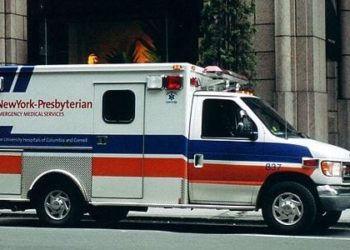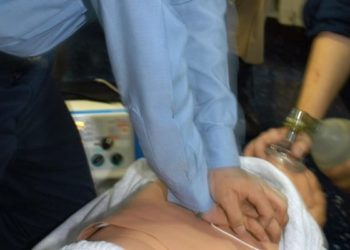Mild hypothermia improves neurological outcome after cardiac arrest [Classics Series]
Image: PD
1. Initiation of hypothermia protocol for 24 hours after a cardiac arrest significantly improved neurological outcome in surviving patients
2. Patients who underwent the hypothermia protocol had a significantly lower mortality rate at 6 months
3. There were no significant differences in adverse outcomes between the two groups
Original date of publication: February 21, 2002
Study Rundown: This landmark trial demonstrated that inducing mild hypothermia early in patients who suffered a cardiac arrest reduces permanent neurological damage secondary to global cerebral ischemia. The subjects who underwent cooling within 4 hours of cardiac arrest experienced better neurological outcomes as well as a lower mortality rate 6 months out from the event (RR 0.74; 95%CI 0.58-0.95). There was no difference in adverse outcomes between the two groups in the first 7 days after the event, although data showed a trend toward susceptibility to infections in the hypothermia group.
The subjects in the normothermia group did have a higher prevalence of diabetes mellitus and coronary artery disease compared to the hypothermia group, however the significance of the results did not change when these differences were controlled for. While the study was not blinded with regards to implementation of therapy, neurological assessment 6 months after therapy was blinded. The time to initiation of the hypothermia protocol also varied within the group, ranging from 61 to 192 minutes, with a median of 105 minutes. It would be interesting to assess whether the time to initiation of cooling made a difference in neurological outcomes 6 months later. In summary, the patients who underwent cooling within 4 hours after a cardiac arrest from ventricular fibrillation showed a significantly higher rate of favorable neurological outcome compared to the patients who underwent standard normothermia treatment.
Click to read the study in NEJM
Click to read an accompanying editorial in NEJM
In-Depth [randomized, controlled study]: This 2002 study published in NEJM was a randomized controlled trial with blinded assessment that randomly assigned 275 patients coming in to the ED with a cardiac arrest due to ventricular fibrillation to either standard normothermia or to a mild hypothermia protocol. Eligible subjects were patients between 18-75 years of age who had suffered a cardiac arrest from ventricular fibrillation and had an estimated 5-15 minute delay before cardiac resuscitation was started. Patients with coagulopathies, pregnancy, terminal illness, other causes of cardiac arrest, in a coma state at baseline, or hypotensive or hypoxic for 30 min or 15 min, respectively, prior to randomization were excluded. The group assigned to mild hypothermia treatment was cooled to a target temperature between 32°C to 34°C with the use of an external cooling device and ice packs, if necessary. The temperature was maintained at 32°C to 34°C for 24 hours and was followed by passive rewarming, which averaged out to an 8-hour period.
The study demonstrated that the group assigned to mild hypothermia treatment had a significantly higher rate of favorable neurological outcome (as assessed blindly 6 months later via the Pittsburgh cerebral performance scale) than the group that underwent standard normothermia treatment (55% vs. 39%, RR 1.40; 95%CI 1.08-1.81). The hypothermia group also had a significantly lower 6-month mortality rate compared to the normothermia group (RR 0.74; 95%CI 0.58-0.95). There were no significant differences in complication rates in the first 7 days after randomization between the two groups.
By Milana Bogorodskaya and Andrew Cheung, M.D.
©2012-2013 2minutemedicine.com. All rights reserved. No works may be reproduced without expressed written consent from 2minutemedicine.com. Disclaimer: We present factual information directly from peer reviewed medical journals. No post should be construed as medical advice and is not intended as such by the authors, editors, staff or by 2minutemedicine.com. PLEASE SEE A HEALTHCARE PROVIDER IN YOUR AREA IF YOU SEEK MEDICAL ADVICE OF ANY SORT.








